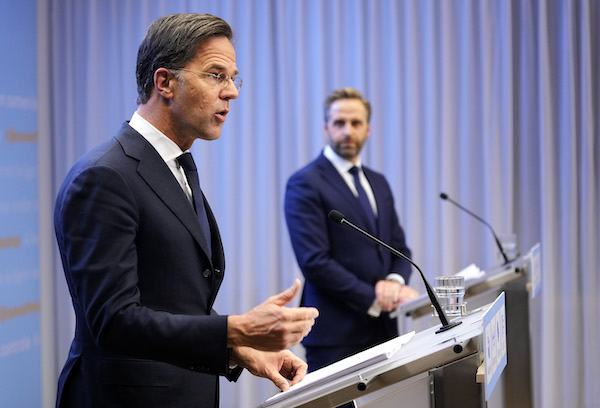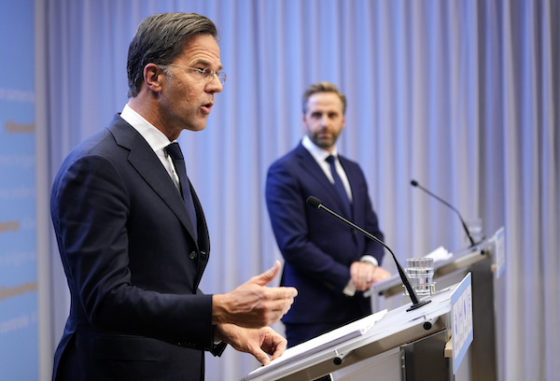Face masks are back, more working at home, as Dutch bring back anti-Covid rules


The Netherlands is bringing in new measures to control coronavirus in a bid to reverse the sharp rise in new cases, and tougher rules are also in the pipeline if there is no improvement.
The new plans were outlined by ministers at a press conference on Tuesday evening, shortly after officials raised the risk level to ‘severe’ now that the average number of hospital admissions per day is above 100.
Although social distancing will not be compulsory, it is the government’s ‘urgent advice’, prime minister Mark Rutte told a press conference on Tuesday evening.
People are also being urged to spend at least half their working week based at home, and to avoid rush hour travel. Some 12% of new cases of coronavirus can be traced back to work.
From November 6, a valid coronavirus pass will be required on cafe terraces, at museums, and at amateur sports events for the over-18s but Sinterklaas processions will be exempt, Rutte said.
Face masks will also be compulsory again in all public buildings and shops, as well as in railway stations and airports. Students will also have to wear masks when moving between classes, and they will also brought back for people working in contact professions such as hairdressers, but not for sex workers.
Masks will not be required in places where coronavirus passes are needed.
Health minister Hugo de Jonge said that public health institute RIVM expects that the number of coronavirus patients on IC wards will be double the current total by mid December.
‘We cannot permit the number of Covid patients to increase too much,’ he said. ‘The more hands are treating Covid patients, the fewer there are to other types of care,’ he said. ‘Most patients are not vaccinated, and they did not need to be there if they had been. And it is others who will have to wait for, say, a new hip.’
Next step
If the new measures do not have an immediate impact, the government will also press ahead with plans to allow employers to require staff to show they have a valid coronavirus pass and introduce the QR code system in non-essential shops and other places.
The system could also be introduced more widely in specific villages and areas where there are a large number of infections and a low vaccination rate.
The decision on whether or not to bring in tougher rules will be taken before November 12, when there is a new press conference.
Hospitals
‘We are going to look at the hospital developments.. and that means people who have already been infected,’ Rutte said. ‘We’re also going to look at specific data, how many people use the roads, what is in the waste water etc… and what that says about our behaviour. If we do stick to the new recommendations, then we will be okay.’
De Jonge also made a direct appeal to camera to people who have not been vaccinated and urged them to rethink. ‘Ask your questions, you are always welcome to ask them,’ he said. ‘Think about it again, do it for yourself, for your neighbour, for your grandmother.’
The government is not planning to bring in specific measures for people who have not been vaccinated as yet and, Rutte said, they are free to participate in society if they get tested.
‘Saying you can’t go in [because you are not vaccinated] is not in our plans, but you can’t rule it out in the future,’ Rutte said.
Thank you for donating to DutchNews.nl.
We could not provide the Dutch News service, and keep it free of charge, without the generous support of our readers. Your donations allow us to report on issues you tell us matter, and provide you with a summary of the most important Dutch news each day.
Make a donation